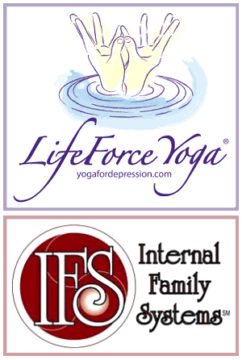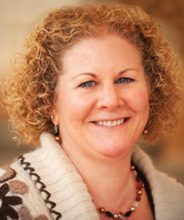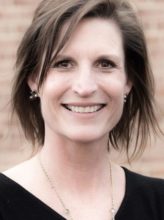
Sherry Rubin, Liz Brenner and Amy Weintraub write about the weaving together of Internal Family Systems (IFS) and LifeForce Yoga (LFY).
In The Flow: Lifeforce Yoga® And Internal Family Systems Therapy
LifeForce Yoga® (LFY) practices are not only appropriate on the yoga mat but also in clinical settings. Presence, perspective, centered, compassion, connection, calm… these are a few of the words that describe who we already are beneath the constraints of our moods. Both LFY and IFS are described as ‘constraint release’ practices, that is, when we meet our challenges with compassion, both practices help us to clear the space, and we are able meet ourselves as whole; that which needs unburdening (IFS) can be released (LFY) and healed. This can happen in IFS with words alone, or in LFY with yogic practices and without words. Together IFS and LFY are synergistic and powerful paths to wellbeing.
I felt the next and more deepening level of work happened for me personally and professionally when I became a client and also trained in IFS. I am so grateful to be able to combine IFS and LifeForce Yoga in my own personal journey. – Amy Weintraub
Internal Family Systems Therapist and clinical social worker Liz Brenner, Director of Therapy Training Boston, says, “LifeForce Yoga supports IFS work seamlessly when clients are able to bring a practice to a  part of them who is exhibiting symptoms of depression, anxiety or trauma.” In IFS, therapy clients get to know parts of themselves who are stuck in the past. These younger parts use coping strategies that made sense in the past but are no longer serving them. Brenner says that when a client chooses to take care of a younger, distressed part with a soothing practice from LifeForce Yoga, “their whole system calms down and is able to do the deep work of releasing parts from the burden of roles they no longer need to play in the present.”
part of them who is exhibiting symptoms of depression, anxiety or trauma.” In IFS, therapy clients get to know parts of themselves who are stuck in the past. These younger parts use coping strategies that made sense in the past but are no longer serving them. Brenner says that when a client chooses to take care of a younger, distressed part with a soothing practice from LifeForce Yoga, “their whole system calms down and is able to do the deep work of releasing parts from the burden of roles they no longer need to play in the present.”
Sherry Rubin, LCSW, a LifeForce Yoga mentor and an IFS therapist, recently had a session with a client who had spent the previous week anxious and upset about challenges and fears  concerning the future of her marriage. She described being physically sick: light headed, upset (“sick to her”) stomach, tired and sleeping a lot. She wanted to find out more about the anxiety she believed was causing all these physical symptoms. IFS helped her gain some clarity, curiosity and compassion. She discovered her anxious part wanted to be soothed by her husband. We acknowledged that and asked if that part were willing to experiment and see if the client herself could offer some soothing. Not instead of, just for this moment. Rubin taught her bee breath, and since she practices metta or loving-kindness meditation, Rubin asked her if she could imagine the vibrations she created with this breath as carrying loving kindness throughout her body. There was a visible shift and the client noted remarkable relief after this practice. They continued processing the experience in the IFS model, and to end, Rubin added one simple bija mantra (sound) with mudra (hand gesture) and bhavana (image) chosen by the client to seal the practice. The client was delighted to report how much physically better she felt and she commented that the time spent in the body gave the thinking and speaking parts a bit of a rest, and the inner system felt more balanced and calm.
concerning the future of her marriage. She described being physically sick: light headed, upset (“sick to her”) stomach, tired and sleeping a lot. She wanted to find out more about the anxiety she believed was causing all these physical symptoms. IFS helped her gain some clarity, curiosity and compassion. She discovered her anxious part wanted to be soothed by her husband. We acknowledged that and asked if that part were willing to experiment and see if the client herself could offer some soothing. Not instead of, just for this moment. Rubin taught her bee breath, and since she practices metta or loving-kindness meditation, Rubin asked her if she could imagine the vibrations she created with this breath as carrying loving kindness throughout her body. There was a visible shift and the client noted remarkable relief after this practice. They continued processing the experience in the IFS model, and to end, Rubin added one simple bija mantra (sound) with mudra (hand gesture) and bhavana (image) chosen by the client to seal the practice. The client was delighted to report how much physically better she felt and she commented that the time spent in the body gave the thinking and speaking parts a bit of a rest, and the inner system felt more balanced and calm.
Brenner describes how she used LifeForce Yoga to work with “Jane,” a 65-year old woman who has had many years of talk therapy with a number of clinicians. Jane is the primary caretaker of her husband who suffers from Alzheimer’s disease. Jane reported feeling anxious and depressed. In the first session, she demonstrated a well-‐practiced ability to tell a negative story about herself in a way that contributes to unhappiness. Jane expressed interest in getting to know the depressed part of her who suffers mightily, thinking she is “no good.” Jane said she feels overwhelmed by this part of her. Brenner’s goal was to help her with the sense of feeling “no good,” but first she needed to help the overwhelmed part who was taking center stage, so she could attend to the “no good” part of her. This is an example of depression and anxiety dancing together in a way that keeps
people stuck.
Brenner asked Jane where she sensed the overwhelm in her body. She said it was primarily in her chest, describing it as a rapid heartbeat, shallow breathing and tingling in her hands. To help the anxiety Brenner suggested they try creating a bhavana, a LifeForce Yoga practice that uses imagery and mudra (hand gestures that sometimes include breath and sound). First, she asked Jane if she would like to try to help the overwhelmed part of her. In IFS terms, this collaborative move is accessing the client’s Self to be the caretaker for her part. This provides a context in which parts are cared for from the ground of the clients being rather than risking the perception that the therapist is trying to impose a practice or make a part of them go away.

Jane said that she did want to help the overwhelmed part, Then Brenner invited her to close her eyes and see if she might create a soothing image of a place where she had felt peaceful in the past. She created an image of a calm river. Brenner invited her to put her hands on her thighs in adhi mudra, a soothing and grounding hand gesture like a baby’s fist. Then Brenner encouraged her to breathe in through the nostrils to the count of four and then to sustain her breath for a moment (not more than four counts) with the image of the calm river in her mind. Then Brenner invited her to exhale slowly, still sensing the calm river. They practiced this breath three times, and then Brenner guided Jane to create an intention like “peace breathes through me now” or other words that seemed to flow with her image as she exhaled. She came up with “I am that river of calm.” After repeating this practice three times with her mantra, Brenner asked Jane how her overwhelmed part was reacting to the practice. Jane said her overwhelmed part felt relaxed and was ready to step back so she could get to know the depressed part of her. Brenner asked her to make sure all her parts were on board with the idea of getting to know the depressed part before moving ahead and Jane’s therapy progressed well after that.
IFS Goes to the Mat with LifeForce Yoga
On April 6 – 8, 2018 in Silver Spring, MD, Amy Weintraub, LifeForce Yoga Founder and best-selling author of Yoga for Depression and Yoga Skills for Therapists, along with licensed Marriage and Family Therapist Angela Huebner, Ph.D., will present a powerful workshop and guide you in practices that access your natural compassion and wisdom. This weekend is open to the public, yoga teachers, and health professionals. All bodies and abilities are welcome! Click here for more information and register today to reserve your spot!
Our internal system provides us feedback if we listen. The combination of IFS and LFY provide just the tools we need to slow down and tune in. – Angela Huebner, Ph.D.
More About IFS Psychotherapy
The Internal Family Systems (IFS) model of psychotherapy offers a clear, non-pathologizing, and empowering method of understanding human problems, as well as an innovative and enriching philosophy of practice that invites both therapist and client to enter into a transformational relationship in which healing can occur.
Click here to read Dr. Schwartz’s article “The Larger Self,” his inspiring first-hand account of how he developed and uses the IFS Model and the extraordinary, transformative effect it has on him and his clients.
Angela Huebner, Ph.D., is a licensed Marriage and Family Therapist (LMFT) in private practice in Falls Church, Virginia. She combines the art of psychotherapy with the science of change to help p eople identify and break out of patterned thoughts and behaviors that keep them stuck. She is a certified IFS clinician and LFY practitioner. In her 17 years as a tenured associate professor in the Department of Human Development’s Marriage and Family Therapy Program at Virginia Tech, Angela taught various clinical courses including Internal Family Systems and interpersonal neurobiology. Angela believes that when we are out of alignment with ourselves or with our partners, our system (body, mind, spirit) lets us know. Sometimes our system uses the language of depression. Sometimes worry and anxiety. Sometimes anger or sadness. Sometimes aches and pains.
eople identify and break out of patterned thoughts and behaviors that keep them stuck. She is a certified IFS clinician and LFY practitioner. In her 17 years as a tenured associate professor in the Department of Human Development’s Marriage and Family Therapy Program at Virginia Tech, Angela taught various clinical courses including Internal Family Systems and interpersonal neurobiology. Angela believes that when we are out of alignment with ourselves or with our partners, our system (body, mind, spirit) lets us know. Sometimes our system uses the language of depression. Sometimes worry and anxiety. Sometimes anger or sadness. Sometimes aches and pains.
For more information about Angela go to angelahuebner.com
Are there any upcoming trainings in yoga and ifs?
Teresa Talley MA LMHC
Woodinville, WA